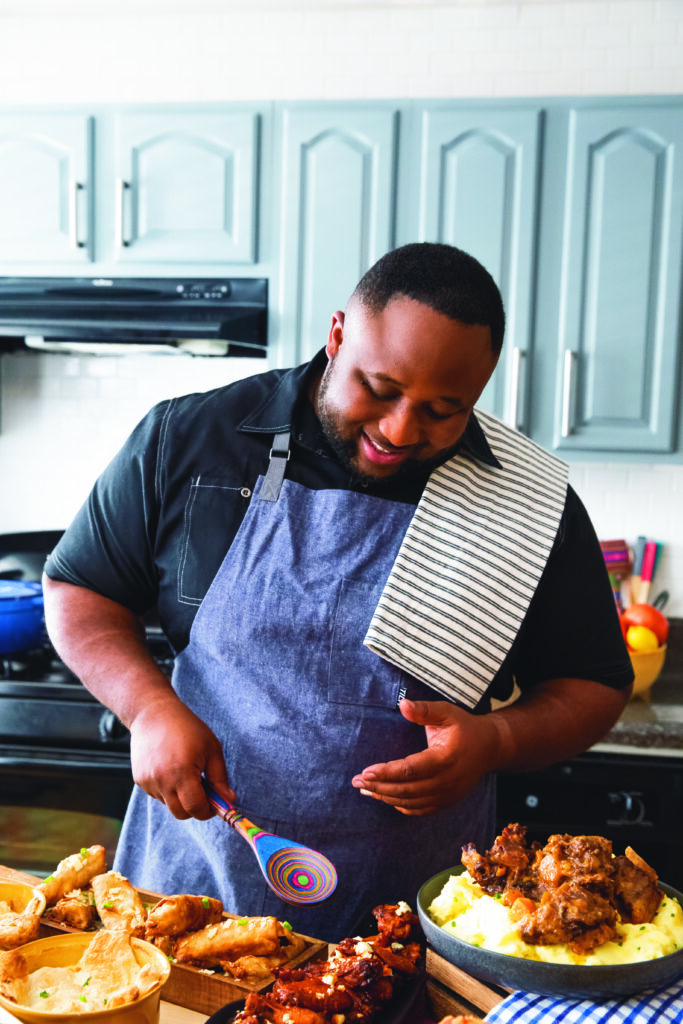Food is one thing that often stands out when exploring the world as a Black traveler. The West African dish Jollof Rice resembles the New Orleans staple Jambalaya. Okra is a popular vegetable in African American households and is also a staple in West African cooking. Leafy greens, including collard greens, cabbage, and turnip greens, are used across the diaspora, as are root vegetables, yams, sweet potatoes, and plantains.
Now, a new television series will explore this connection. In the TV One series Savor the City, James Beard House-honored chef Jernard Wells takes viewers on a flavorful journey through some of the most influential U.S. and Caribbean cities.
“Savor the City isn’t just a food show—it’s a love letter to our history, resilience, and innovation,” Wells tells Travel Noire. “It’s about giving flowers to those who came before us and those standing and leading the charge present day while inspiring the next generation to carry on these traditions in fresh, new ways.”
The new series reveals the untold stories of Black culinary and regional history. Chef Wells ventures off to learn about the fiery beginnings of Nashville hot chicken and inspects the Afro-Caribbean influences in Miami. However, he doesn’t stop at food but also explores the wine and spirits industries. Viewers will see familiar faces, including Fawn Weaver of the Black-owned whiskey brand Uncle Nearest and Robin McBride of the McBride Sisters Collection.
In an interview with Travel Noire, Chef Wells explained the importance of the series, which airs on April 3.

Travel Noire: Tell us what surprised you the most while working on this series and why.
Chef Jernard Wells: One of the biggest surprises while filming Savor the City was how deeply connected our food, culture, and traditions are across regions. I knew we had a rich culinary and artistic heritage, but seeing the through-lines between San Francisco, Miami, South Hampton’s cooking, Martha’s Vineyard, Creole flavors, and the Southern techniques passed down for generations really reinforced how Black food is a living, breathing history lesson. Every meal told a story, and that was powerful.
TN: What do you think are misconceptions about Black food?
JW: One of the biggest misconceptions is that Black food is just “soul food” and that it’s unhealthy. Yes, soul food is an integral part of our method of creating cuisine, but Black food is vast—it’s refined, global, and deeply innovative. We’ve been crafting plant-based dishes long before it was trendy, using whole grains and fresh vegetables in ways that are both nourishing and flavorful. Black food is diverse and elevated and reflects resilience and creativity.

TN: What were some of your favorite dishes you tried while filming this journey?
JW: Every city has something special! If I had to name a few, I would say [in] Shelbyville, Tennessee, Humble Baron‘s shrimp and grits was unforgettable. It had that perfect balance of smokiness, sweetness, and spice.
I had red beans and rice in New Orleans at LiL Dizzy’s Cafe. It was so rich and layered that it felt like a warm embrace. While in the Bahamas, I was impressed by the fusion of African and Caribbean flavors at Goldie’s Conch house. Every dish carried a piece of history, making it even more special. I loved my experience at Cafe Rue Dix, which specialized in French Senegalese cuisine [where] I had stewed red fish with vegetables over Jollof rice!! I felt like I had gone home with the owners to have a meal in their family kitchen. It’s hard to say which is the best!
TN: What do you hope viewers will take away from watching the TV One series?
JW: I want people to walk away with a deeper appreciation for the cultural impact of Black food, art, and entertainment and how it has helped shape American culture. I also hope it inspires people to explore their own food heritage, celebrate the chefs and artists who keep these traditions alive, and, most importantly, see food as a gateway to understanding and connection.
TN: Why do you think a series exploring Black culture is important?
JW: Food is one of the most powerful ways to tell our story. Black culture has influenced every corner of American cuisine, yet our contributions have often been overlooked or not given the credit they deserve. Savor the City is about reclaiming that narrative, showing how our flavors, techniques, and traditions have shaped the food world. It’s also about breaking stereotypes and highlighting the brilliance of Black entrepreneurs, chefs, and artists who continue pushing the culture forward.





